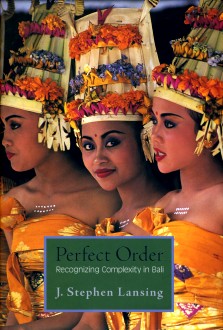|
Perfect
order : recognizing complexity in Bali / J. Stephen Lansing. -
Princeton (NJ) : Princeton university press, 2006. -
XII-225 p. : ill. ; 23 cm. -
(Princeton studies in
complexity).
ISBN
0-691-02727-7
|
NOTE
DE L'ÉDITEUR
: Along rivers in Bali, small groups of farmers meet
regularly in water
temples to manage their irrigation systems. They have done so for a
thousand years. Over the centuries, water temple networks have expanded
to manage the ecology of rice terraces at the scale of whole
watersheds. Although each group focuses on its own problems, a global
solution nonetheless emerges that optimizes irrigation flows for
everyone. Did someone have to design Bali's water temple networks, or
could they have emerged from a self-organizing process ?
Perfect Order
— a groundbreaking work at the nexus of
conservation,
complexity theory, and anthropology — describes a
series of
fieldwork projects triggered by this question, ranging from the
archaeology of the water temples to their ecological functions and
their place in Balinese cosmology. Stephen Lansing shows that the
temple networks are fragile, vulnerable to the cross-currents produced
by competition among male descent groups. But the feminine rites of
water temples mirror the farmers' awareness that when they act in
unison, small miracles of order occur regularly, as the jewel-like
perfection of the rice terraces produces general prosperity. Much of
this is barely visible from within the horizons of Western social
theory.
The fruit of a decade of
multidisciplinary research, this absorbing
book shows that even as researchers probe the foundations of
cooperation in the water temple networks, the very existence of the
traditional farming techniques they represent is threatened by
large-scale development projects.
| ❙ |
J. Stephen Lansing is Professor in the Departments
of Anthropology and Ecology and Evolutionary Biology at the University
of Arizona, and Research Professor at the Santa Fe Institute. |
|
| EXCERPT |
|
The
transition from myth
to reason
remains a problem even for those who recognize that myth too contains
reason.
☐ Marcel Detienne, The
Masters of Truth in Archaic Greece
— cité en épigraphe |
The water
temples
of Bali went mostly unnoticed until the Green Revolution in
agricultural interfered with their role in the management of the rice
terrace ecology. But even after their functional role became apparent,
they proved to be difficult to comprehend from within the horizons of
Western social science. Water temple networks depend on unprecedented
levels of cooperation among farmers ; they actively manage the
ecology of the rice terraces at the scale of whole watersheds, and they
appear to be organized as dynamical networks. Moreover, a great deal of
what goes on in them falls into the Western category of
« religion » or even
« magic ». But from the
perspective of Balinese
farmers, these « magical » ideas
and practices
provide indispensible tools for governing the subaks 1,
the rice paddies, and their own inner worlds. Water temple rituals draw
on Hindu and Buddhist tradition of thought to create the preconditions
for a robust system of self-governance. The wedding of these ideas with
the managerial capacity of temple networks provides powerful tools for
communities to impose an imagined order on the world. However, the
farmers' recognition that such tools exist is coupled with an awareness
of the ease with which they can fail. A certain kind of self-mastery,
and awareness of interdependencies, is understood to be a prerequisite
for governing both the social and natural worlds. These Balinese ideas
about selfhood contrast with the celebration of the emergence of the
autonomous subject in Western social thought. (A darker vision, perhaps
most cogently expressed by the scholars of the Frankfurt School,
associates the triumph of the unitary subject with rise of totalitarian
rationality. But these two versions of the story of the emergence of
the subject, which seem to us so far apart, draw similar connections
between objective economic conditions and the subjective awareness of
individuals.) The world of the water temples, I suggest, has different
lessons to impart.
☐
Introduction,
pp. 18-19
| 1. |
Subaks
are egalitarian organizations that are empowered to manage the rice
terraces and irrigation systems on which the prosperity of the village
depends. — Introduction,
p. 5 |
|
|
| COMPLÉMENT
BIBLIOGRAPHIQUE |
- « Evil
in the morning of the world : phenomenological approaches to a
Balinese community », Ann Arbor : Center
for South and
Southeast Asian Studies, University of Michigan (Michigan Papers on
South and Southeast Asia, 6), 1974
- « The
three worlds of Bali », New York : Praeger,
1983
- « Priests
and programmers : technologies of power in the engineered
landscape of Bali », Princeton (NJ) :
Princeton
university press, 1991, 2007
- « The
Balinese », Fort Worth (Texas) : Harcourt
Brace college publishers, 1995
- «
Islands of order : a guide to complexity modeling for the
social sciences » with Murray P. Cox, Princeton (NJ) :
Princeton
university press, 2019
|
| J.
Stephen Lansing |
|
|
| mise-à-jour : 30 novembre 2021 |

|
|
|
|